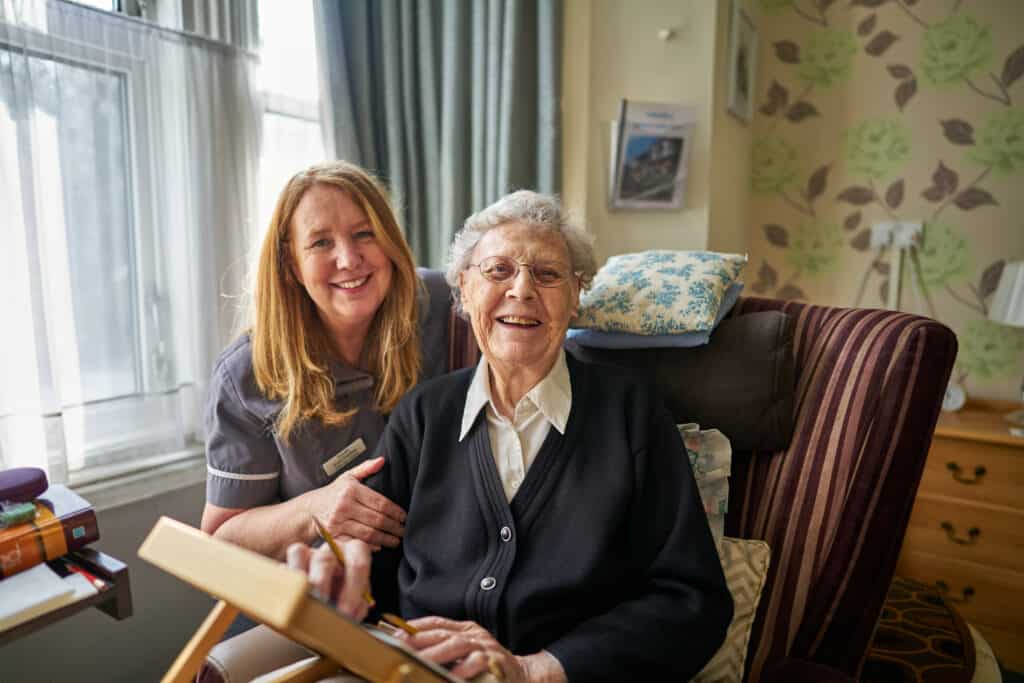What’s important when choosing a care home

Author: Pilgrims' Friend Society
If you are involved with ministry among older people you may have the privilege of supporting someone through their decision to move to a care home. Our partner charity Pilgrims’ Friend Society runs Christian care homes for older people. They have shared with us some things to bear in mind when making this decision, both in terms of the general provision and from a spiritual perspective.
1 Ethos
The ethos of a home will influence its approach to care. For example, Pilgrims’ Friend Society homes are founded on the belief that older people are precious in God’s sight and should have opportunities to flourish in later life. The Way We Care is our bespoke Christian approach to care which you can read about here. For any home, look for care that is person-centred where individual preferences can be accommodated.
2 The person’s needs
A care needs assessment from a local authority can help identify the level of need and guide the person towards a home where this will be met. To find out how to apply for this assessment, visit www.gov.uk/apply-needs-assessment-social-services.
3 Funding
Depending on financial circumstances, a person may be eligible for funding from their local authority. Where relevant, this level of funding will be determined following the care needs assessment. You should check if the care home you are considering is accepting residents with local authority funding.
4 Location
The person may want to stay in their local area, close to family, friends and their existing church. Or they may want to move to a new area to be nearer loved ones. We find that for some people it is so important to move to a Christian home they are willing to relocate from a different area of the country. In England, a person has the right to move to a care home in any area as long as it can meet their needs and is affordable to them.
5 Size
Research suggests that smaller household settings are best placed to provide personalised care and support. An example of this is Middlefields House in Chippenham where residents live in households of 12 people. In larger care homes, a household atmosphere can be made possible through the organisation of staff teams/physical space.
6 Facilities
As well as finding out what the bedrooms are like, you’ll want to know about the communal spaces. What are the lounges/ dining areas like? Is there a garden or patio area? In the case of an older home, how well has it been adapted to meet modern standards?
7 Care plans
Ask how the home how they create care plans for residents. An individual care plan should be drawn up in collaboration with the person to ensure their needs and wishes are met. This can cover everything from personal care to social interests, personal relationships, hobbies and emotional, spiritual and cultural needs.
8 Staffing
A care home has a duty to provide 24-hour care. The home’s team of carers will be overseen by a Registered Care Manager – you may want to find out the ratio of carers to residents. Other staff roles found at a typical care home include: Business Manager, Activities Co-ordinator, Catering Manager/ Catering Assistant, Maintenance Officer and Housekeepers.
9 Activities
Many homes provide a rota of activities, for example, crafts, cooking, gardening, armchair exercises. This will often be led by an Activities Co-ordinator. Activities may also be led/supported by volunteers. A home may be able to provide you with a sample activities rota. We employ Activities and Community Engagement (ACE) Facilitators. These staff members are all Christians who are dedicated to enriching every aspect of our residents’ lives, including spiritually. To this end, they work closely with volunteers from local churches. Find out more about our Activities and Community Engagement (ACE) Programme here.
10 Spiritual well-being
For older Christians, living in community with others who share that faith can be enormously encouraging. In Pilgrims’ Friend Society homes, all our senior managers and are Christian. The life of the home includes devotional times and opportunities for prayer, which is especially helpful to people who can no longer get to church regularly. If a Christian home is not option, look for a home that will welcome in clergy and volunteers from local churches.
11 Food
To cater for different tastes, many homes offer more than one choice at mealtimes. You may be able to ask for a sample menu. Special dietary requirements should be provided for, but it’s worth knowing what this might look like in practice. You can also check the Food Standards Agency’s rating for the home – five is the highest rating.
12 Dementia care/ other specialised care
If the person is living with dementia, it is essential to find a home where staff are specially trained in dementia care. Similarly, if you need to know how other specialist needs (mobility, sight issues learning disabilities) will be supported.
To find out more about the Christian care homes provided by Pilgrims’ Friend Society, please visit: www.pilgrimsfriend.org.uk/care-homes
(April 2024)
